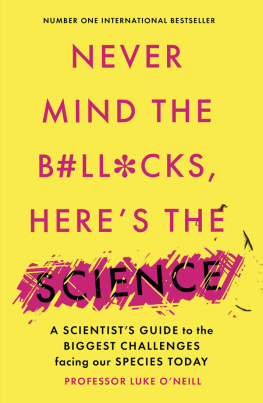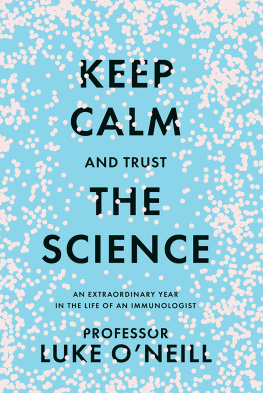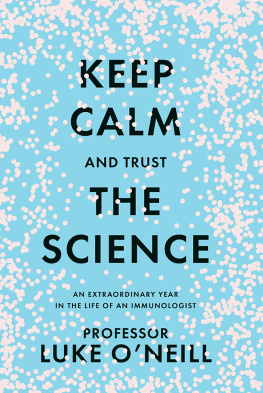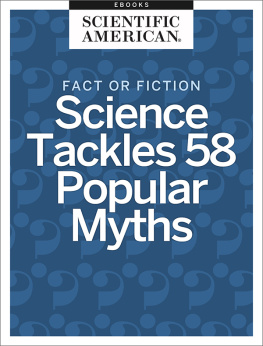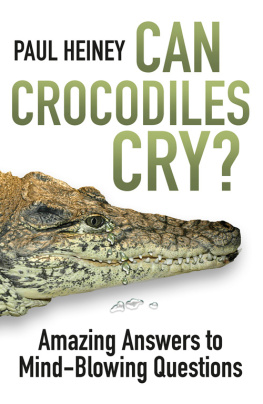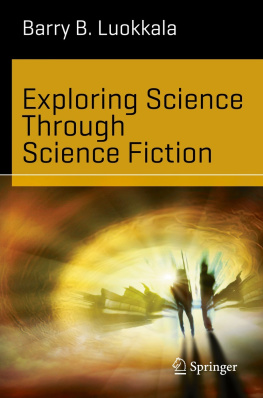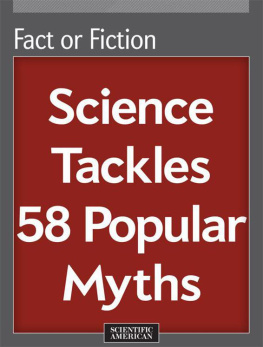Contents
Guide


SWIFT PRESS
First published in Ireland by Gill Books 2020
First published in Great Britain by Swift Press 2021
Copyright Luke ONeill 2020, 2021
The right of Luke ONeill to be identified as the Author of this Work has been asserted in accordance with the Copyright, Designs and Patents Act 1988.
Original design by Graham Thew
Design origination of this edition by Bartek Janczak
Edited by Djinn von Noorden
Proofread by Neil Burkey
Bed Blocker Blues from The Luckiest Guy Alive by John Cooper Clarke reproduced with permission of the Licensor through PLSclear
Typeset in Freight Text pro Book
A CIP catalogue record for this book is available from the British Library
ISBN: 9781800750760
eISBN: 9781800750777
For my sister Helen, who has spent her life caring for all the lonely people.
ACKNOWLEDGEMENTS
Thanks to Sarah Liddy of Gill Books, who asked me to consider writing a book about how science can inform big questions (but who, I imagine, never thought that b#ll*cks would be in the title ). Thanks, as ever, for your support, Sarah. Thanks also to Aoibheann Molumby, editor at Gill Books, for excellent editing and many insightful comments.
Several people read the text for me to check facts (and took glee in correcting me) and made some great suggestions: first, Andy Gearing, a fellow immunologist. I met Andy when I was working in the UK and we began a scientific collaboration on an immune cell type he discovered called NOB cells (I wont go into it). More important, one day I went to his flat for lunch and he said, See what you can find in the fridge. All I could find there was a bottle of champagne and a jar of lime pickle. I knew Id found a lifelong friend. Andy read the whole book twice and came up with so many great suggestions that he should be a co-author. Tough luck, Andy no royalties for you.
The following people read various chapters: my sister Helen and my wife Margaret both made excellent suggestions for the chapter on men versus women. Cliona OFarrelly (another fellow immunologist) was a great sounding board for some of the topics in this book. Zbigniew Zaslona (post-doctoral scientist in my lab) made several suggestions and was always great to bounce things off. Brian McManus (who apparently was once a GP, although I find that hard to believe) suggested I include material from The Matrix and The Hitchhikers Guide to the Galaxy, as well as suggesting that the list of occupations in the bullshit jobs chapter should include only academics. Brian also made important suggestions for the chapters on euthanasia and racism. Duncan Levy (climate engineer) checked the climate change chapter. My colleague and fellow immunologist Kingston Mills made great suggestions for the vaccines chapter. Aongus Buckley (economist and Thomas Paine fan) and Neil Towart (lefty Australian) made suggestions on the bullshit jobs chapter. Aongus also checked the chapters on racism and on control in life, as did fellow Bray-ite Frances Gleeson (who has more degrees than me). Ken Mealy (surgeon) and Colm ODonnell (physician) both made suggestions for the chapter on euthanasia. Colm also read the chapters on drug legalisation (he knows a lot about drugs ) and on racism and made important suggestions. Donal OShea (physician) made great comments on the dieting chapter and suggested that I include fat-shaming. Chris McCormack (Trim gentleman and former prison governor) made suggestions for the chapters on jail and drug legalisation. And my old mate John OConnor (neuroscientist) made suggestions for the chapters on addiction and depression. Finally, a big thanks to Stevie ONeill and Sam ONeill, who didnt read this book at all, but thanks anyway, lads.
CONTENTS
INTRODUCTION
Nothing in life is to be feared, it is only to be understood.
Now is the time to understand more, so that we may fear less.
Maria Skodowska Curie
W ELCOME TO Never Mind The B#ll*cks, Heres The Science. The title captures exactly what this book is about. Its about the science behind the biggest issues that confront our species today. These issues intrigue me, and hopefully you: control over your life; vaccination; dieting; mental health; addiction; legalising drugs; racism; men and women; bullshit jobs; climate change; euthanasia; the future. Using my scientific training, Ive examined the science in each of these topics. I have, in the inimitable words of Matt Damon in the The Martian, literally scienced the shit out of them. B#ll*cks and shit? Theres two rude words already, and in a science book!
Science is so great because its based on information that comes from experiments and data that have been independently checked and ultimately reproduced by different scientists. Scientists are competitive and love scientific combat and, when they work together, they are unbeatable. The best want the truth. Science is the antidote to fake news, so we need it now more than ever. We are all astounded by whats happened with COVID-19, the disease caused by the virus SARS-CoV-2. That pandemic has revealed how we need science more than ever, and I discuss several of the topics through the lens of that particular malicious virus. My goal is to get as close to the truth as I can on all of these topics, using science as my only guide.
To be a scientist is to be a sceptic. This is why they argue with each other. I read a great quote recently from a 1924 issue of the Massachusetts Institute of Technologys Tech Engineering News magazine (thats how much of a sceptic I am checking back issues of MIT newsletters). It said, The predominant feature of the scientifically trained mind is the ability to associate cause with effect. It is not content with the knowledge and application of facts, but it seeks the reason therefore. It is continually in a state of unrest, turmoil, irritation. Moreover, it manifests a natural inclination and willingness to know the reason why. Unrest, turmoil and irritation? Sounds great, doesnt it? But it makes an important point. Scientists obsess about associating cause with effect. Or to put it another way, determining the link between correlation and causation. Vaccines correlating with, but being responsible for protection against, an illness. A diet correlating with, and hopefully causing, weight loss. An antidepressant correlating with, but being the reason for, improved mental health. A genetic variant correlating with and causing criminal activity. Being female correlating with, and being the reason for, increased empathy. Human activity correlating with, and causing, global warming.
The correlation/causation issue is critical in science: you might well correlate one thing with something else, but that doesnt mean that what is being correlated is the cause of something else. For example, there is a correlation between smoking and cancer. For a long time, tobacco companies claimed that this was just a correlation. But then the science became irrefutable smoking causes cancer. This can be proven with rigorous statistics and by coming up with a mechanism, which proves the link. In the case of smoking, the mechanism is chemicals in the cigarette smoke: these cause mutations in the genes that produce proteins which, when mutated, cause cancer. The case that smoking causes cancer took off when in 1953 scientists showed that mice painted with tobacco tar developed tumours. Study after study confirmed this observation and extended it, providing the mechanistic link. Game over. This led to panic at tobacco companies who met secretly in New Yorks Plaza Hotel to start their campaign to counter the bad publicity, dubbed the most astonishing corporate deceit of all time.

